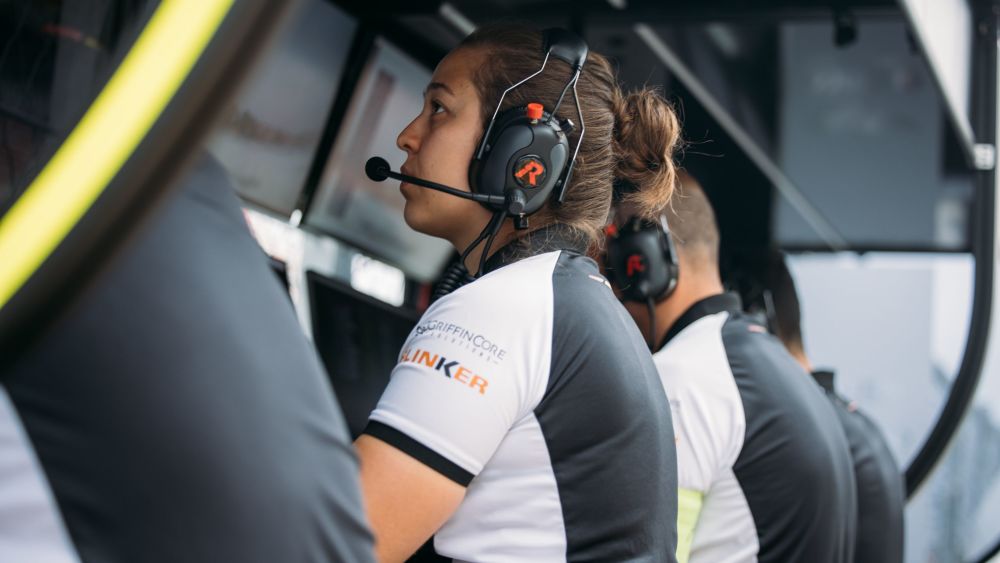“Don’t be afraid to get into motorsport” - Celebrating International Women in Engineering Day
Engineers are the backbone of motorsport. From devising strategies that have changed the dynamics of races, to ensuring reliability of their cars, to developing their drivers from their first single-seater days all the way to Formula 1 — engineers are critical to shaping the high-tech, fast-paced sport we know today.In honour of International Women in Engineering Day, we spoke to three female engineers who are leading the way for young women in F1 ACADEMY about their experiences and they offered invaluable advice on the opportunities and pathways, as well as the challenges they overcame. Campos Racing Team Manager Gabriela Parra might now serve as Carrie Schreiner’s race engineer, but she admits that wasn’t the career journey she originally planned to take.“Initially, I wanted to work in the industrial environment,” Parra admitted. “I started my career working in the manufacturing industry and that’s when I had the twist to work in the motorsport environment because of the influence of my family and the environment itself.”For Charlotte Phelps, Emely De Heus’ engineer at MP Motorsport, her journey towards the paddock began at university. Whilst qualifications are important, she believes nothing is better than getting hands-on experience trackside.“I did maths, further maths, physics and history at A Level and then I did a degree in electronic engineering with music technology,” Phelps explained. “I was lucky that my family's already involved in motorsports, so I was building cars at home. As part of my degree, I did a year in industry, so I went to Mercedes Formula One Team for a year in the middle of my degree.”She added: “Qualifications aren’t really the name of the game. Most people here have an engineering degree, but a lot of it comes down to experience in the industry as well. There are two different ways in — either you can do an apprenticeship or you can do a degree, but qualifications are sort of the least (important thing), it's more about experience.”Gabriela Parra has also worked as an LMP2 Data/Systems Engineer on FIA World Endurance Championship.Joining F1 ACADEMY this year, Eimear O’Connor works as Maya Weug’s race engineer at PREMA Racing and couldn’t wait to get stuck in.“I studied mechanical engineering in Dublin at Trinity College,” she explained. “So, I did four years of that as an undergrad and then I did a master’s in mechanical engineering. Actually, I didn't do anything, let's say, specifically correlated. It's all the fundamentals of thermodynamics and everything, but I ended up doing a biomedical project whilst doing my master’s degree. Then after that, I ended up getting into motorsports.“I did a year of work experience and then I also did an additional master’s, which was the race engineering master’s at the University of Pavia in Italy, which was a lot more hands on and practical. We actually got to go testing with an F4 car and learn how to run the car, understand more, have some formal modules on vehicle dynamics, and so, a bit of a roundabout way to go.READ MORE: Léna Bühler on forging ahead in FRECA and what it takes to win in Barcelona“I was already working in PREMA as an intern with F3 as a data engineer. So, I did an internship there, but I previously had experience in GT racing for one year before as a data engineer at Lamborghini. So, when I finished my time with F3 data at the end of the season, they said ‘look, would you like to be a race engineer F1 ACADEMY?’ I was like yeah, I would really, really like to do that, so super enthusiastic to start.”Dealing with the high-pressured motorsport environment isn’t without its sacrifices or difficult moments, and being able to keep calm under pressure, not get thrown off by the often unexpected moments in racing and take lessons from every situation are critical qualities to succeeding as an engineer.“It might seem super glamourous that you’re travelling all over the world and it’s great,” O’Connor said. “You don’t sleep a lot, especially with the scheduling. For us with F1 ACADEMY, we’re a support race, so a lot of the time, we have to work around the F1 timetable, so it means super early races and then also, super late races. “So, I think that’s the part that people don’t realise, that you travel and you get to see these places. We’re here for work and we're generally on the track all the time —we go to the hotel and we come back. Sometimes we do get a few free days if we're travelling in between, but I think a part people underestimate is how much work you have to do.2024 is the first time that Maya Weug has a female engineer alongside her“The main thing is you need to be really good with time management. Number one, you could never be late, it’s part of the job. Also, critical decision making. You have very little time normally to make an accurate decision, so it's really, really important that you actually come up with the right information at the right time and make a decision in the correct way in the right time. There

This is another headline indexed and brought to you by the AUTOMUNDO website.
